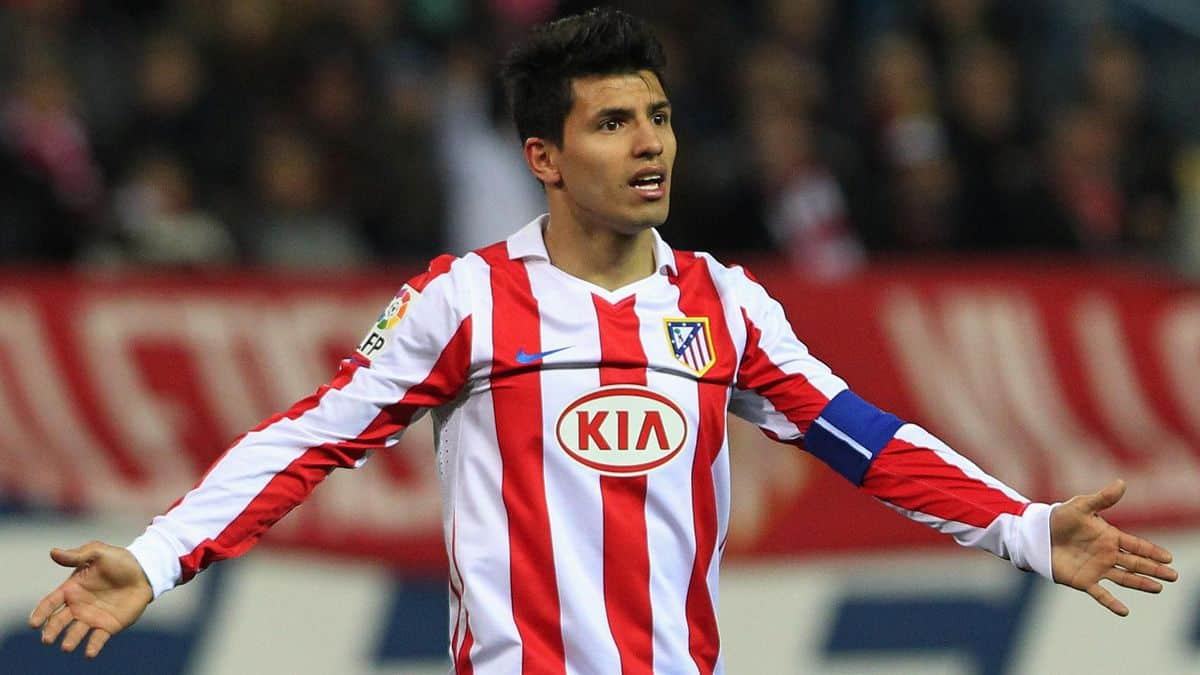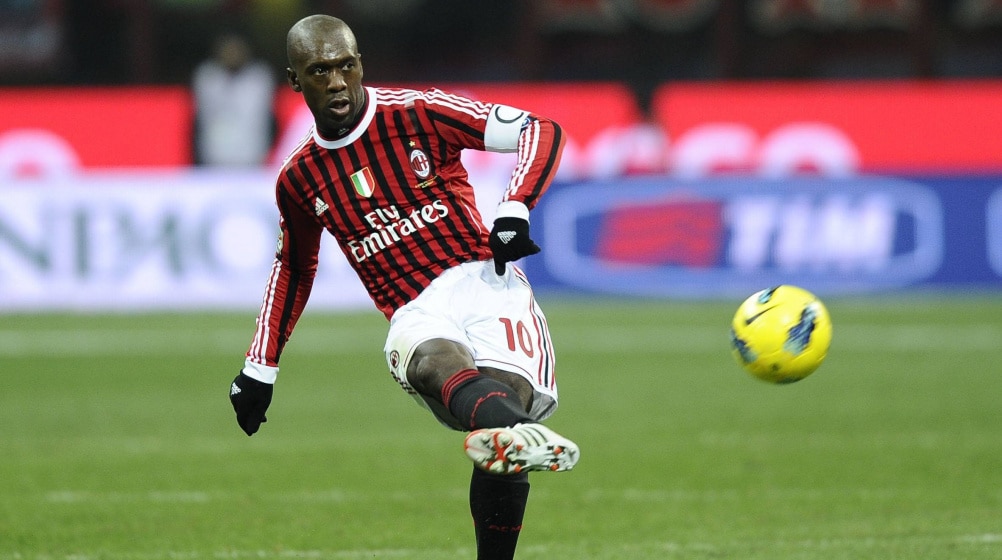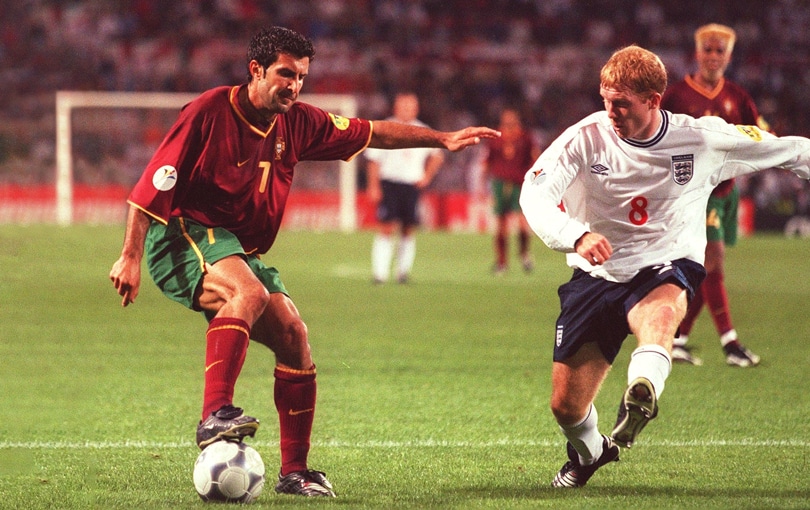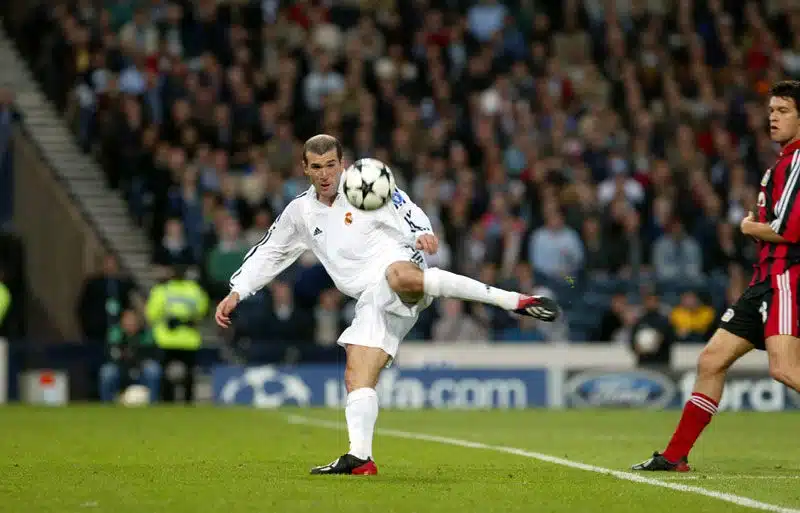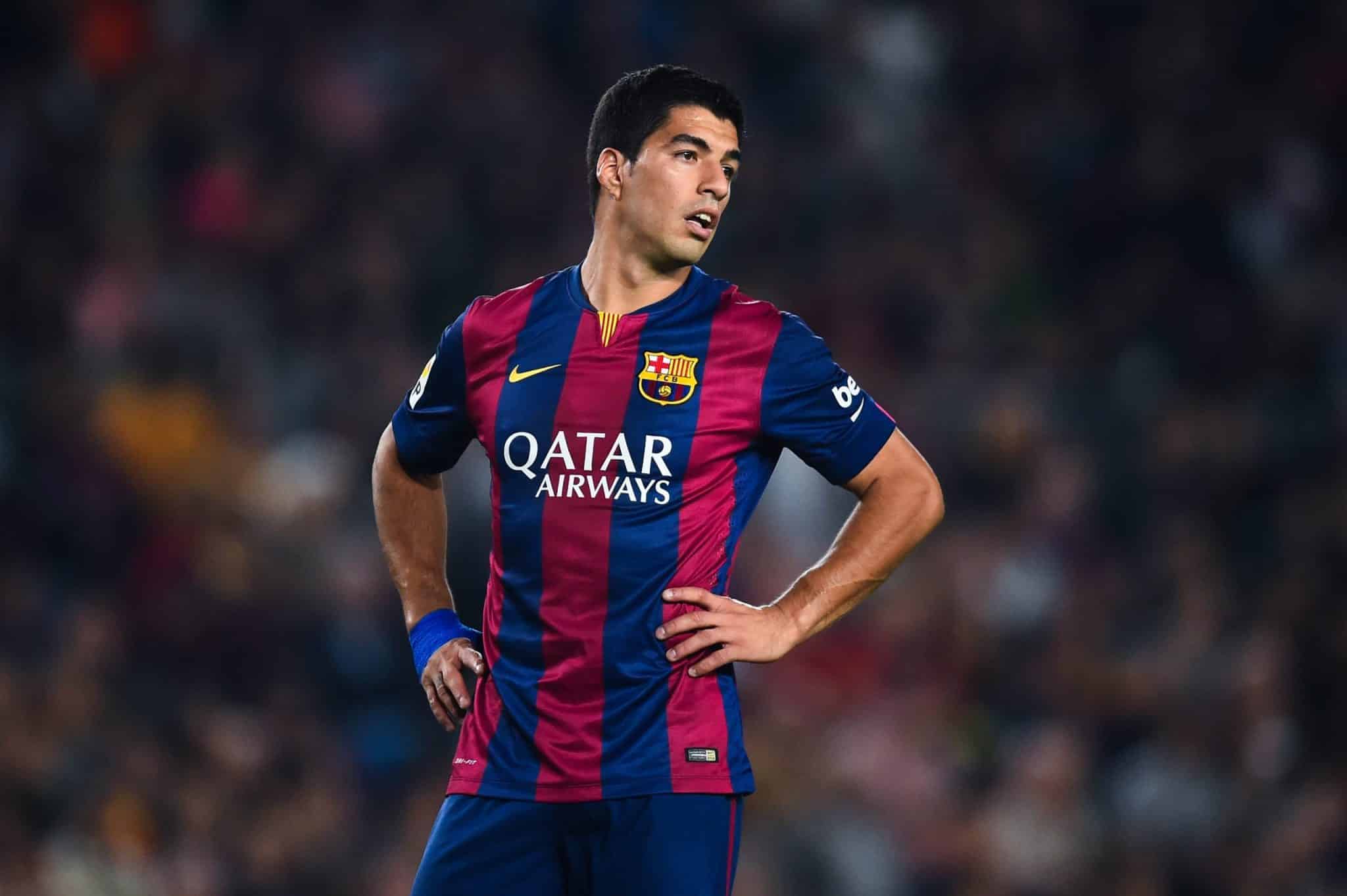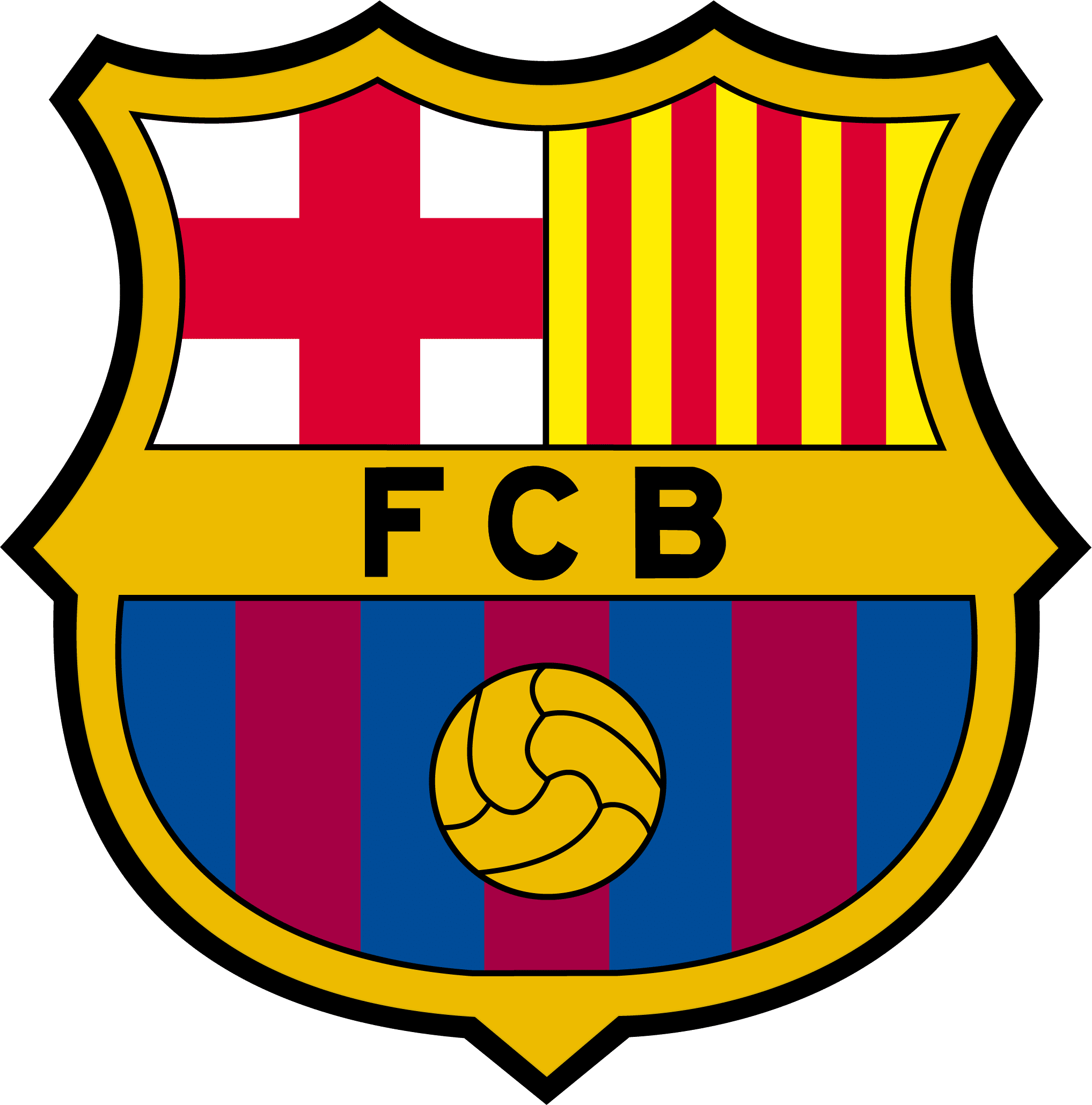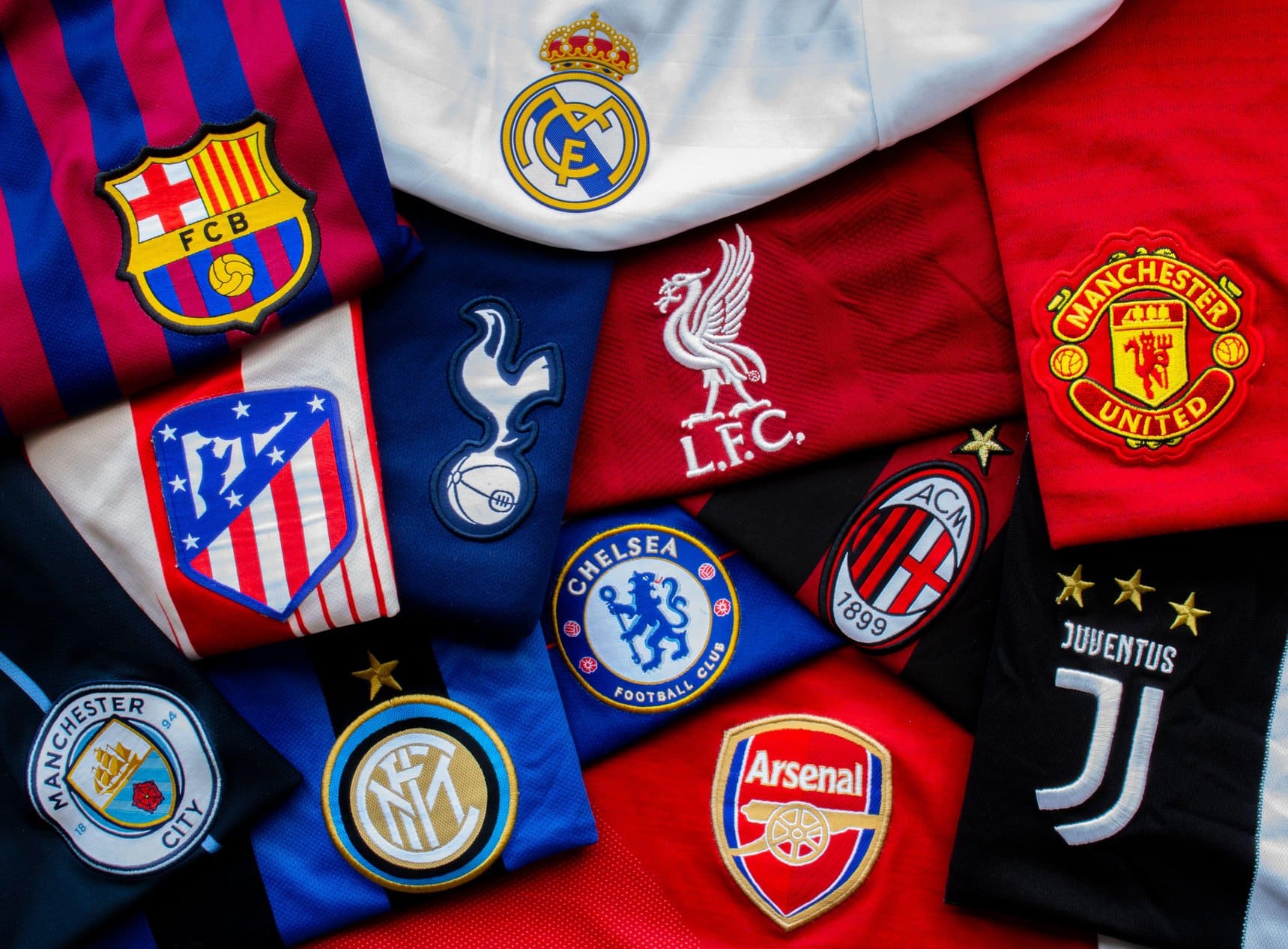Over the past decade, few footballers have commanded the global spotlight quite like Luis Suárez.
Nicknamed “El Pistolero”, the Uruguayan striker has etched his name into the list of all-time great footballers, delivering a scintillating career that has seen him reach some of the highest peaks of the sport.
In this article, we will look back at Suárez’s career through the football jerseys he wore.
Nacional 2005-06
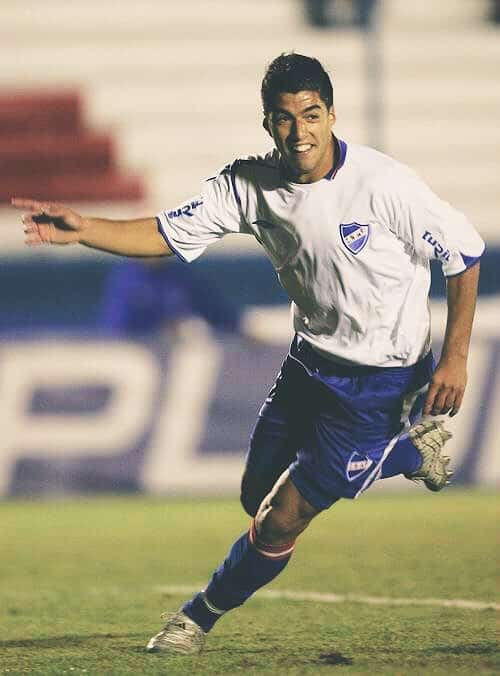
Before conquering the world stage, a young Luis Suárez first made his mark playing for his hometown club, Club Nacional de Football, in his native Uruguay.
Born and raised in the capital city of Montevideo, Suárez joined Nacional’s youth academy as a teenager, quickly rising through the ranks to earn his senior debut in 2005 at just 18 years old. Though he was still raw and unpolished, Suárez’s innate talent and insatiable hunger were immediately evident, as he became a fixture in Nacional’s starting XI and played a pivotal role in the club’s domestic success.
Suárez was spotted by a group of scouts from the Dutch club Groningen when they were in Uruguay to scout another player. As they watched, he won and converted a penalty and scored a “wonder goal” against Defensor.
After watching only that match, the scouts approached Suárez and said they wanted to buy him, and after the season, Groningen paid Nacional €800,000 for him.
FC Groningen 2006-07
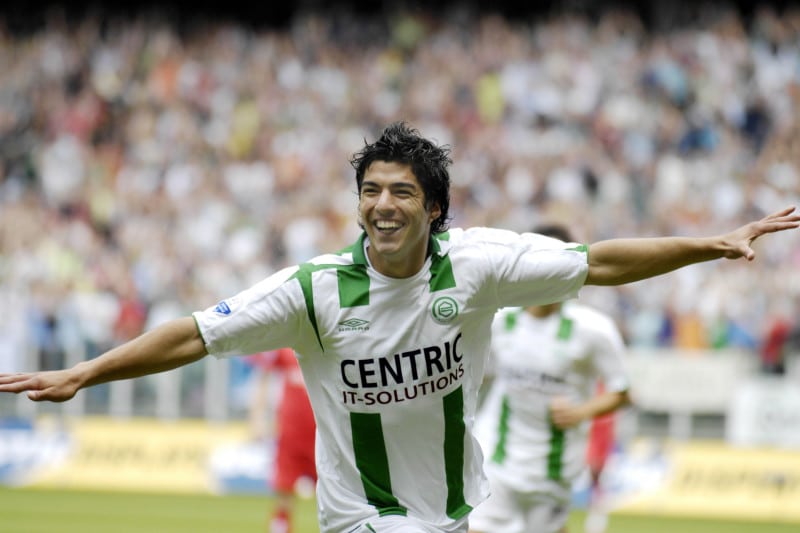
Luis Suárez joined Dutch club Groningen in 2006 at the age of 19, marking his first move to European football. During his two seasons with the club, Suárez made a strong impression and showcased his goal-scoring abilities.
In his debut campaign, Suárez scored 9 goals in 33 Eredivisie appearances, helping Groningen finish 11th in the league. The following season, he took his game to the next level, netting 17 goals in 33 matches. This included a hat-trick against De Graafschap, demonstrating his clinical finishing.
Suárez’s performances caught the attention of bigger clubs, and in 2007 he secured a move to Ajax, one of the Netherlands’ top teams. His spell at Groningen was relatively short but impactful, as it allowed him to gain valuable experience and exposure to European football.
Ajax 2007-11
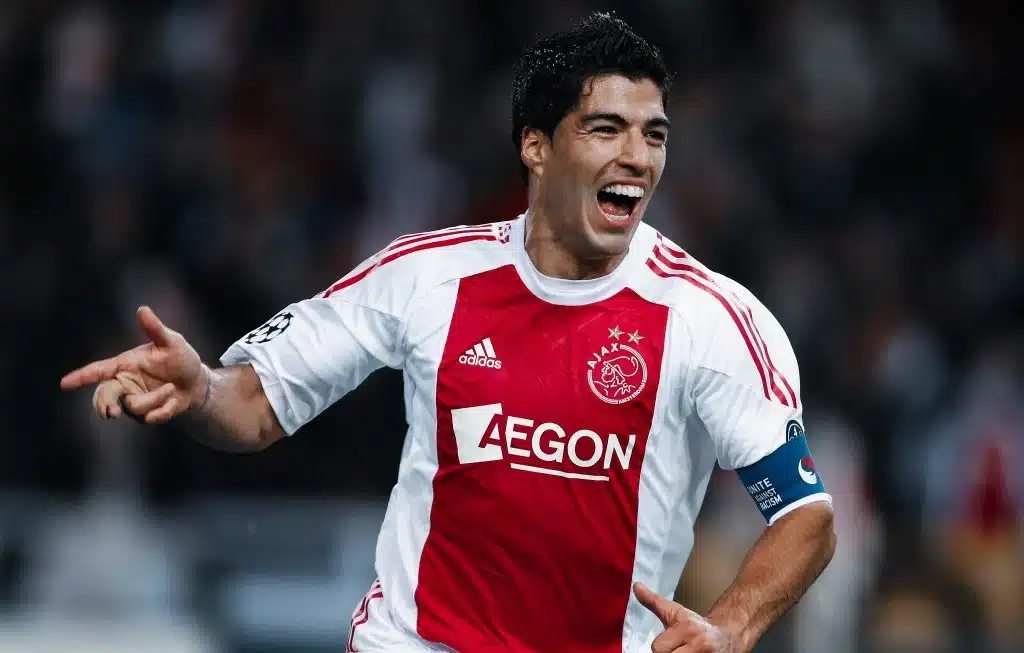
After his impressive two-year stint at Groningen, Luis Suárez secured a move to one of the Netherlands’ most prestigious clubs – Ajax. In August 2007, the young Uruguayan striker joined the Amsterdam-based side, kicking off a highly successful four-year spell that would cement his reputation as one of Europe sought after lethal marksmen.
At Ajax, Suárez quickly established himself as a talismanic figure, spearheading the club’s attack with his relentless work rate, skilled dribbling, and clinical finishing. In his debut season, he netted an impressive 17 league goals, helping Ajax clinch the Eredivisie title.
Over the next three years, Suárez went from strength to strength, consistently delivering outstanding performances and finding the back of the net with alarming regularity. He won three more Eredivisie championships with Ajax, cementing their domestic dominance, and also guided the club to the UEFA Champions League quarter-finals in 2010-11.
Suárez’s goal-scoring exploits at Ajax were nothing short of remarkable. He found the net a staggering 111 times in 159 appearances across all competitions, establishing himself as one of the most prolific strikers in the club’s illustrious history. His electrifying displays and ability to single-handedly decide games made him a fans’ favourite, as well as a player wanted by some of Europe’s elite clubs.
One of the first controversial incidents in Luis Suárez’s career occurred during his time at Ajax. In a Dutch Cup match against PSV Eindhoven in 2010, Suárez infamously bit the shoulder of PSV’s Otman Bakkal. The shocking incident, which was caught on camera, resulted in Suárez receiving a seven-match suspension from the Dutch Football Association.
Suárez’s time at Ajax laid the foundation for the superstar status he would later achieve at his future clubs showcasing his world-class talent and laying the groundwork for an extraordinary career at the top level of European football.
Liverpool 2011-14
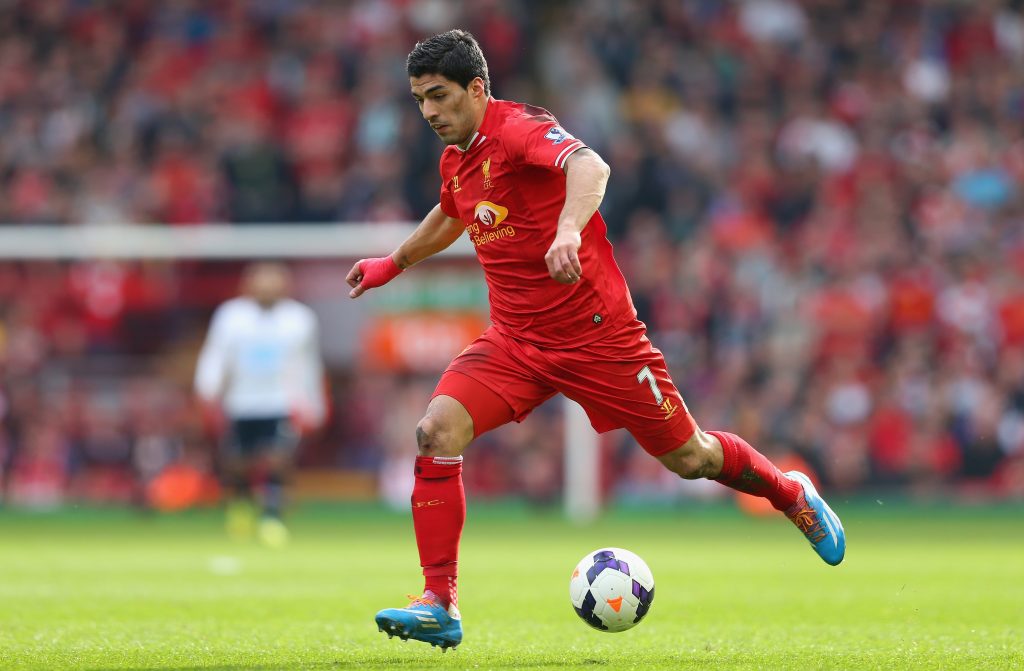
After four successful seasons with Ajax, where he had firmly cemented his reputation as one of Europe’s most lethal strikers, Luis Suárez earned a high-profile move to the Premier League, joining Liverpool in January 2011. The Uruguayan’s arrival at Anfield was met with great anticipation, as the Merseyside club looked to the forward to help them return to the upper great heights of English football.
Suárez wasted little time making an impact at Liverpool, hitting the ground running with a string of impressive performances. His combination of technical ability, tireless work rate, and clinical finishing made him an immediate fan favourite on the Kop. In his first full season with the club, the Uruguayan striker scored 17 league goals and provided 11 assists, showcasing the skill and creativity that had defined his time in the Netherlands.
Over the next few years, Suárez continued to reach new heights, establishing himself as one of the Premier League’s most valuable marksmen. In the 2013-14 season, he enjoyed a simply extraordinary campaign, netting 31 goals and providing 17 assists to inspire Liverpool’s unlikely title challenge. His individual brilliance that year, which included memorable hat-tricks against West Bromwich Albion and Norwich City, cemented his status as one of the world’s best players.
Liverpool Controversies
During his tenure at Liverpool, the forward had multiple controversies.
One of the most controversial incidents in Luis Suárez’s career occurred in 2011 when he was accused of racially abusing Manchester United defender Patrice Evra during a Premier League match. Suárez was alleged to have used a racial slur multiple times towards Evra, sparking a high-profile investigation by the English FA.
After a lengthy process, Suárez was found guilty and handed an eight-match suspension, as well as a substantial fine. The incident caused a major rift between Suárez and Evra, with the pair refusing to shake hands in a subsequent match.
Liverpool initially defended their player, but the club was ultimately forced to accept the FA’s verdict. The racism controversy further damaged Suárez’s reputation, but he was able to regain the support of Liverpool fans through his continued excellence on the pitch in the years that followed.
In 2013 when he was involved in another biting incident. In a match against Chelsea, Suárez sank his teeth into the arm of defender Branislav Ivanović, an act that was caught on camera and sparked outrage.
The Uruguayan striker was subsequently handed a 10-match ban by the English FA for the offence, the longest suspension ever given to a player for an on-field incident. Liverpool condemned Suárez’s actions, but the club stood by their star player throughout the ordeal.
Though Suárez’s time at Liverpool was not without controversy, his sheer quality and importance to the team’s success was undeniable. His electrifying displays, combined with his unwavering commitment and boundless passion, made him a true hero for the club’s supporters.
Barcelona 2014-20
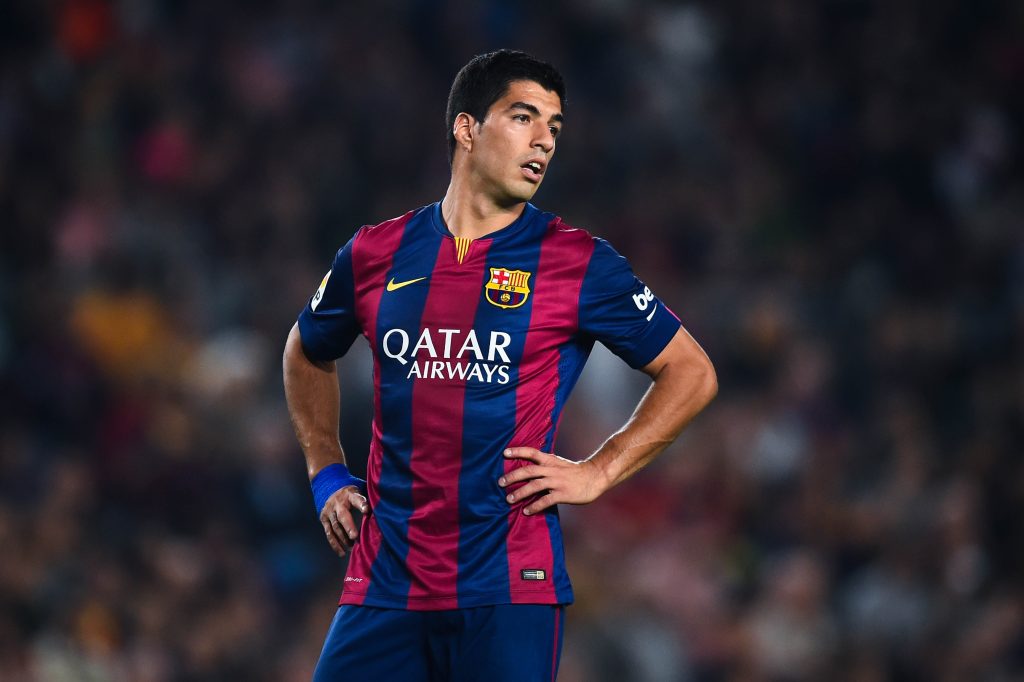
After his tumultuous but hugely successful spell at Liverpool, Luis Suárez secured a high-profile move to Spanish giants Barcelona in 2014.
It was a transfer that united one of the world’s most lethal strikers with one of the most talented squads in world football, and the Uruguayan’s time at Camp Nou would go on to cement his status as an all-time great in the sport.
Suárez hit the ground running in Catalonia, quickly forming a formidable attacking trident alongside Lionel Messi and Neymar. His ability to seamlessly integrate into Barcelona’s slick, possession-based style of play was remarkable, as he provided the perfect foil for the creativity and goal-scoring prowess of his two star teammates.
In his debut season, Suárez netted an impressive 25 league goals, helping Barça clinch the domestic double of La Liga and the Copa del Rey.
The following year, Suárez truly established himself as a Barcelona legend. He was one of the driving forces behind the club’s historic treble-winning campaign, scoring 40 goals in La Liga and a further 13 in the Champions League – including a crucial strike in the final against Juventus.
His overall tally of 59 goals in all competitions that season was a personal best, underlining his status as one of the most prolific strikers on the planet.
Suárez’s goal-scoring exploits, combined with his tireless work rate, clever movement, and unselfish link-up play, made him an integral part of Barcelona’s sustained success during his six-year stay. He won four La Liga titles, four Copa del Rey trophies, and the Champions League on one occasion, cementing his place as one of the club’s all-time great players.
When he eventually departed in 2020, it marked the end of an era, but Suárez’s legacy as a Barcelona icon was secure.
Atlético Madrid 2020-22
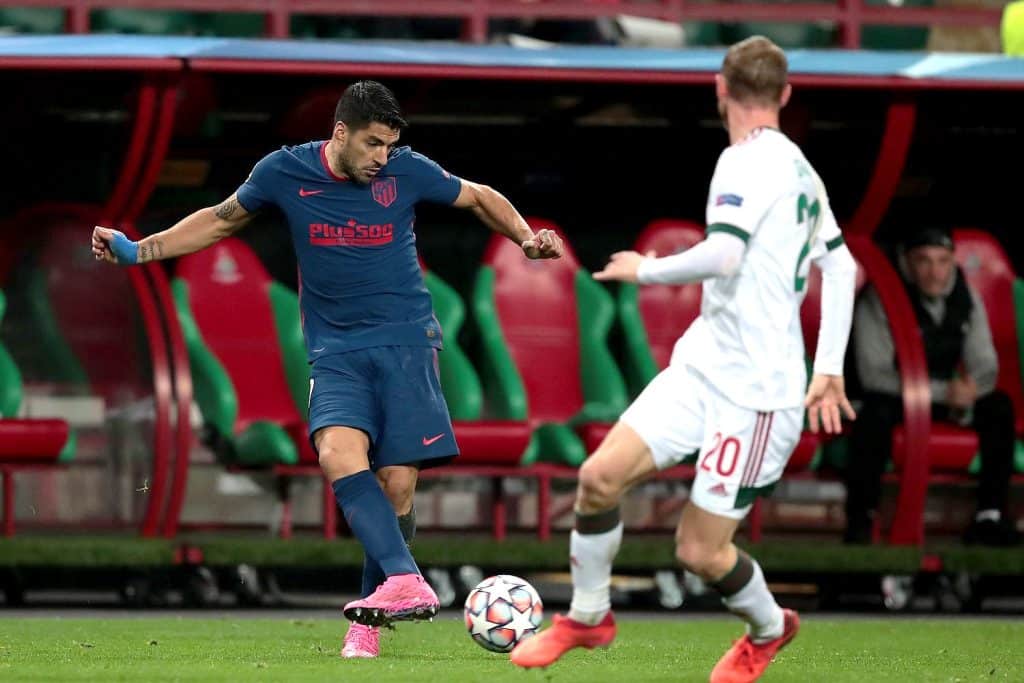
After six hugely successful years at Barcelona, where he cemented his status as one of the world’s elite strikers, Luis Suárez embarked on a new challenge in 2020 – joining Atlético Madrid. The move to the Spanish capital represented a fresh start for the Uruguayan, who was unceremoniously shown the door at the Camp Nou despite his remarkable goal-scoring exploits.
At Atlético, Suárez rediscovered his best form under the guidance of legendary manager Diego Simeone, becoming an integral part of a title-winning team. His first season with the club was a resounding success, as he netted 21 goals in La Liga to fire Atlético to their first league championship in seven years. Suárez’s clinical finishing, intelligent movement, and tireless work ethic made him the perfect fit for Simeone’s pragmatic, counter-attacking system.
The following year, Suárez continued to excel, contributing 16 league goals as Atlético mounted a strong defence of their title. Though his output dipped slightly compared to his debut campaign, the 35-year-old’s experience and leadership helped guide the club to another domestic triumph.
Suárez’s two-year spell at the Wanda Metropolitano Stadium may have been relatively short, but it was hugely impactful. He rediscovered his joy of playing football, while also adding two more league winners’ medals to his already impressive collection. The Uruguay international’s time at Atlético Madrid showed that he still had what it took to guide a team to success.
Nacional 2022

As Luis Suárez continued his illustrious career, the legendary striker made the decision to return to his roots, signing with his boyhood club Nacional in his native Uruguay.
This emotional homecoming, which occurred in the summer of 2022, allowed Suárez to come full circle and reconnect with the team and supporters that had first nurtured his prodigious talent.
At Nacional, Suárez was welcomed with open arms, as the club’s fans celebrated the homecoming of their most famous son. Despite his advanced age, the Uruguayan marksman still had plenty to offer, and he quickly set about making an impact on the pitch.
Suárez’s experience, guile, and predatory instincts in front of goal provided an invaluable boost to Nacional, as he helped the club navigate a successful domestic campaign.
While Suárez’s homecoming may not have had the same global fanfare as his high-profile transfers to the likes of Liverpool and Barcelona, it held deep personal significance. The opportunity to don the famous Nacional jersey once more and play in front of the adoring home supporters was one the striker simply could not pass by.
Grêmio 2023
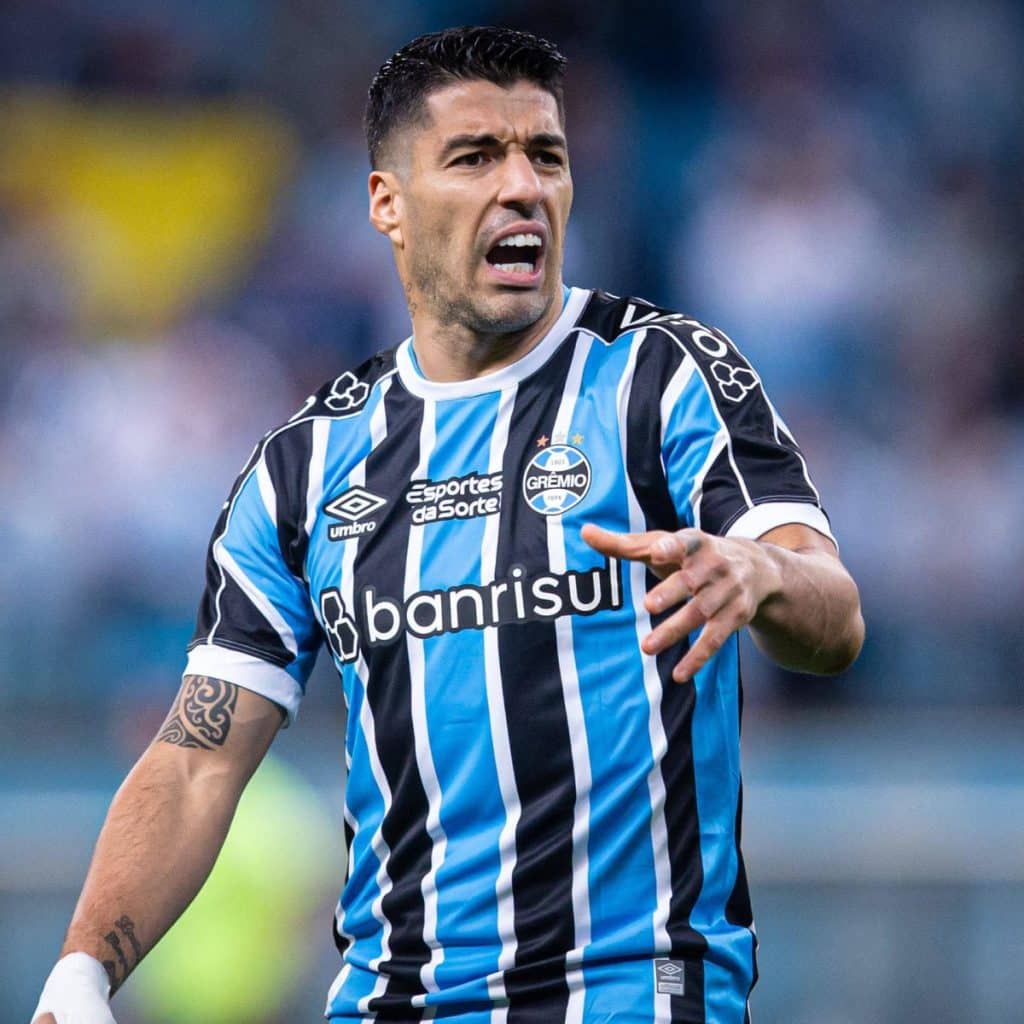
Suárez decided to move to Brazilian club Grêmio at the end of 2022. He made his debut on 17 January 2023 in a match against São Luiz for the 2023 Recopa Gaúcha. Suárez scored a hat-trick in a 4–1 win.
In April Suárez won his second title for Grêmio: the Campeonato Gaúcho. Suárez scored a penalty goal against Caxias at the second leg of the 2023 Campeonato Gaúcho finals, thus beating Caxias 2–1 on aggregate.
Knee issues began to become more prevalent for Suárez. After various rumours in the media, Suárez revealed in a press conference together with Grêmio’s vice-president Antônio Brum that he would shorten his contract to the end of 2023. He finished the Campeonato Brasileiro with 17 goals and 11 assists, totalling 28 goal contributions in 33 games.
He was the leader in goal participation in the competition, leading Grêmio to be the runner-up in the championship. In December, Suárez was elected Best Player of the Brasileirão.
Despite his injury struggles and his age, the Uruguayan continued to show in Brazil that he was capable of being an incredibly effective player.
Inter Miami 2023 – Present

Suárez joined MLS club Inter Miami ahead of the 2024 league season. This move allowed the striker to reunite and play once again with some of his former Barcelona teammates and best friends Lionel Messi, Jordi Alba and Sergio Busquets.
Despite only joining the club a matter of months ago, Suárez has already hit double figures in goals for Miami.
Uruguay 2007 – Present
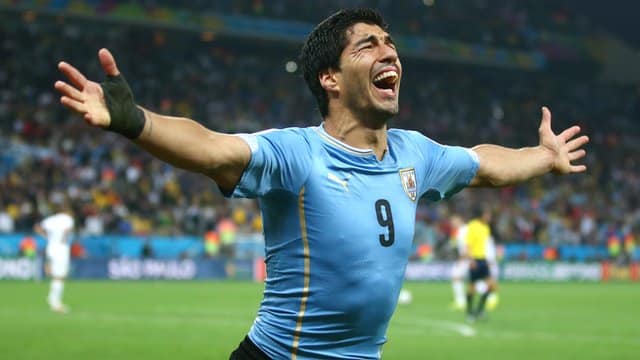
Alongside his remarkable club career, Luis Suárez has also been a talismanic figure for the Uruguay national team over the past 15 years. The Montevideo-born striker has firmly cemented his legacy as one of his country’s all-time greatest players, leading the line with distinction and helping to deliver international honours.
Suárez made his senior debut for Uruguay in 2007 and quickly established himself as a key part of their starting lineup. His goal-scoring exploits, creative flair, and tireless work ethic made him an indispensable asset for the national team as they sought to recapture the glory of their two World Cup triumphs.
At the 2010 World Cup in South Africa, Suárez was a central figure as Uruguay reached the semi-finals, their best performance at the tournament since 1970. His crucial goal in the quarter-final clash against Ghana was marred by the infamous handball incident, but the striker’s overall contribution was pivotal to his country’s deep run.
The 2014 tournament also saw the striker involved in yet another biting incident. Italian defender Giorgio Chiellini was the victim this time around, with Suárez receiving a four-month suspension from all football and handed a nine-game international ban.
Suárez’s crowning achievement with the national team came in 2011, when he captained Uruguay to victory in the Copa América. His tournament-winning goal in the final against Paraguay capped off a dominant individual performance and secured his country’s 15th continental title.
Now with over 139 caps and 68 international goals to his name, Suárez remains a central figure for Uruguay as they continue their quest to add to their illustrious legacy. His sustained excellence at the highest level has cemented his status as one of his country’s all-time great players.

